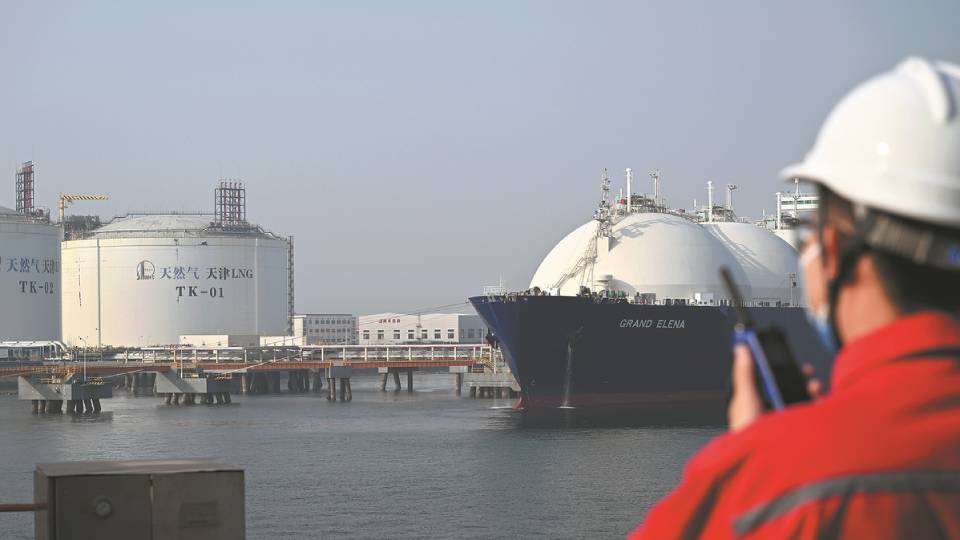
In August, President Trump hosted a marathon of meetings aimed at delivering on a Ukraine-Russia peace deal. Previously, the Trump Administration hinted at reducing or lifting sanctions on Moscow as part of a final deal. A Ukraine peace deal that rolls back sanctions on Russia may undercut China’s energy security by stripping away China’s key advantages enjoyed since 2022, including discounted Russian oil, yuan-denominated payments, and leverage in shipping and insurance. The flow of energy from Russia to Beijing would be more reliable, but China’s bargaining power, pricing privilege, and financial leverage would erode just as its energy dependence deepens.
China’s Russia Advantage
When President Biden and EU leaders rapidly imposed sweeping sanctions on Russia’s economy, China was the clearest winner. Western sanctions cut Russia off from European buyers and pushed Moscow deeper into China’s orbit to sustain Moscow’s economy and be able to afford to keep the war afloat. This forced the Kremlin to unload crude at steep discounts. Chinese refiners rushed in, with Russian oil shipments to China reaching a record 108.5 million tons in 2024 (2.17 mb/d). By 2023, Russia surpassed Saudi Arabia as China’s largest crude supplier, accounting for an estimated 20 percent of China’s energy imports.
The financial architecture shifted as well: by 2023, the yuan had overtaken the dollar as the most traded currency on Moscow’s exchange, with Russian energy companies increasingly settling deals in Yuan. An imposed G7 price-cap further barred Russia from using Western insurers, forcing Moscow to rely on a “shadow fleet” of older, costlier tankers. That shift created space for Chinese traders, who gained an edge by arranging alternative shipping and insurance outside the Western system and were insulated from sanctions.
China’s Potential Losses
If Western sanctions are lifted or loosened as part of a Ukraine peace deal, China’s energy advantages could quickly evaporate. The steep discounts Beijing has enjoyed on Russian crude would likely shrink if Europe and other Western buyers return to the market, pushing Russian oil and gas back to competitive prices. Meanwhile, Russia may also expand energy sales to broader Asia at more competitive rates, undercutting China’s own bargaining power.
Russia’s access to shipping would also improve if Western insurers and shipping clubs — which cover nearly 90 percent of global trade — are back in play. This would reduce Russia’s reliance on “shadow fleet” workarounds that gave Chinese traders a critical lifeline to Russian sellers. Moreover, Russia may seek to scale back its dependence on Yuan-denominated energy deals, which reduces reliance on the U.S. dollar but also subjects Moscow to greater Chinese leverage.
Loosening restrictions could also reshape Russia’s role inside OPEC+. With access to more buyers, Moscow may feel less pressure to maintain cohesion within the energy grouping and instead prioritize revenue and market share over coordination. That shift would heighten the risk of confrontation with Saudi Arabia. The strains were visible earlier this year. In June, Moscow and Riyadh openly clashed over output policy, an episode that could occur again if Russia seeks to recover profit and diversify its buyers beyond China.
Beijing’s Hedge
For Beijing, this spells pricing and access volatility. China is already hedging against market headwinds by doubling down on overlapping supply networks to create breathing space ahead of future instability.
Beijing is leaning harder into its GCC suppliers—Saudi Arabia, the UAE, and Qatar—for long-term, stable contracts. It is also tapping into higher-risk oil access in Iraq, where Chinese firms can secure equity oil at the field level.
At the same time, Beijing is cultivating ASEAN producers as a complementary hedge. Malaysia and Brunei provide liquified natural gas under long-term deals, while Singapore is exploring joint procurement arrangements with state-owned PetroChina.
Finally, China is reinforcing its domestic buffer by expanding its strategic petroleum reserves, which now hold the equivalent of several months of imports. This will allow Beijing to weather price fluctuations and stabilize its energy needs.
The net effect of a Ukraine deal that loosens sanctions on Russia is a more complex energy map which pushes Chinese interests into areas of U.S. influence. China will remain a major Russian customer, but no longer Russia’s buyer of last resort.
This could result in China’s increased dependence on and more leverage for Middle East energy providers. However, given the depth of China-GCC ties, this is unlikely to look like an imbalance in leverage. Instead, it’s more likely to deepen cooperation across the region, entrenching China’s long-term interest in the Middle East.
The Impact in Washington
For Washington, this is a double-edged sword. Ending the war in Ukraine will be a major political win for the Trump Administration, but it would also push China into deeper economic and political interdependence with GCC states.
That shift would likely accelerate Chinese-GCC strategic cooperation across sensitive domains—AI, critical minerals, defense, space, and more—potentially ratcheting up more pressure from within the U.S. to curb Chinese influence abroad. In effect, a peace deal that delivers an end to the war in Europe could simultaneously fuel a new front in U.S.–China competition, this time anchored in the Middle East.








